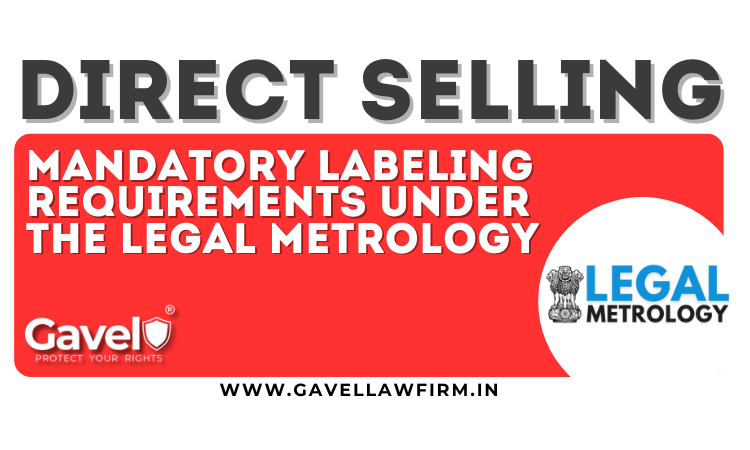Mandatory Labeling Requirements for Direct Selling Entities under the Legal Metrology (Packaged Commodities) Rules, 2011
The Indian direct selling industry, now regulated under the Consumer Protection (Direct Selling) Rules, 2021, continues to witness significant growth. With increasing scrutiny from regulatory authorities such as the Central Consumer Protection Authority (CCPA), it has become imperative for Direct Selling Entities (DSEs) to comply with applicable labeling norms under the Legal Metrology (Packaged Commodities) Rules, 2011 (“Rules”).
Non-compliance with these requirements not only invites penal action under the Legal Metrology Act, 2009, but can also trigger proceedings under the Consumer Protection Act, 2019 for misleading packaging, unfair trade practices, and consumer harm.
This blog provides a consolidated view of the mandatory labeling declarations that must appear on every pre-packaged commodity marketed or distributed by a Direct Selling Entity.
Who is Covered?
Under the Rules, the responsibility to comply with labeling declarations lies with:
Manufacturers
Packers
Importers
Marketers (including Direct Selling Entities selling under private labels or proprietary brands)
If a Direct Selling Entity markets a product under its own name or brand, it is legally considered the manufacturer for the purpose of labeling compliance.
Mandatory Declarations under Rule 6 of the Rules
Every pre-packaged commodity must bear the following declarations clearly, legibly, and prominently on the label:
- Name and Address of the Manufacturer, Packer, or Importer
Full name and address including PIN code.
In the case of imported goods, the importer’s name and address must be declared.
If the DSE markets the product under its own label, its name and address must be disclosed.
- Generic or Common Name of the Commodity
The product’s common identity (e.g., “Herbal Supplement”, “Face Wash”, “Protein Powder”).
This aids consumer understanding and prevents ambiguity.
- Net Quantity
Must indicate the quantity in standard units (weight, volume, length, or number).
Declaration should reflect the quantity at the time of packaging.
- Month and Year of Manufacture or Packaging
Either month and year of manufacture or packaging must be printed.
Important for tracking shelf life and inventory.
- Maximum Retail Price (MRP)
Must include the phrase:
“MRP ₹_ (Inclusive of all taxes)”
No product can be sold at a price exceeding this MRP.
- Customer Care Details
Name, address, telephone number, and email ID of the consumer grievance redressal office.
This is vital for ensuring consumer rights and post-sale grievance resolution.
- Country of Origin
Mandatory for imported products, especially under the e-commerce and cross-border trade ecosystem. - Best Before / Expiry / Use-By Date
Particularly important for:
Food products
Cosmetics
Health and wellness items
Absence of expiry or best-before date may attract penalties under both Legal Metrology and Food Safety laws.
Additional Notes on Labeling for DSEs
Labels must not contain misleading information or ambiguous claims.
No dual MRP: Selling the same product at different prices across platforms or geographies is prohibited.
Labels must be tamper-proof and clearly visible; declarations must not be obscured by stickers or over-labeling.
Penalties for Non-Compliance
The Legal Metrology Act prescribes the following penalties:
Offence Penalty
First offence Fine up to ₹25,000
Second offence Fine up to ₹50,000
Third and subsequent offences Fine up to ₹1,00,000 and/or prosecution
In addition, the Central Consumer Protection Authority (CCPA) may initiate proceedings under the Consumer Protection Act, 2019 for misleading advertisements or unfair trade practices if labels are found deceptive or incomplete.
Intersection with Direct Selling Rules, 2021
Rule 5(5) of the Consumer Protection (Direct Selling) Rules, 2021 mandates that Direct Selling Entities must ensure that goods and services comply with applicable laws, including the Legal Metrology (Packaged Commodities) Rules, 2011. Thus, ensuring labeling compliance is not only a statutory requirement under Legal Metrology but also a precondition for lawful operations in the direct selling ecosystem.
Conclusion
Labeling compliance is a non-negotiable regulatory obligation for Direct Selling Entities operating in India. Given the layered framework involving Legal Metrology, Consumer Protection, and Direct Selling rules, entities must take a compliance-first approach when designing packaging and labels.
At Gavel Law Firm, our team of regulatory lawyers and compliance professionals assist clients in navigating complex labeling requirements, drafting compliant packaging content, and defending against show-cause notices or prosecution under Legal Metrology and consumer laws.
For advisory or audit services related to labeling compliance, feel free to contact us.
Contact us today: www.gavellawfirm.in
Phone: +91-7011520061
Email: contact@gavellawfirm.in

